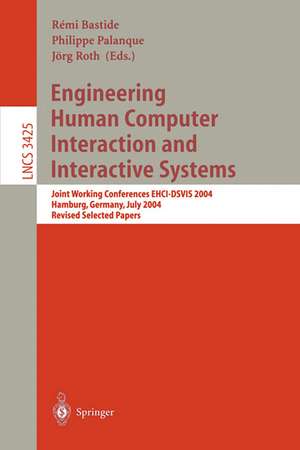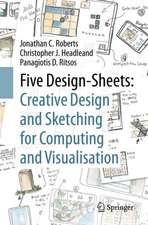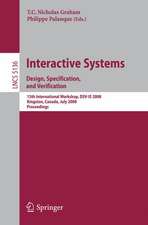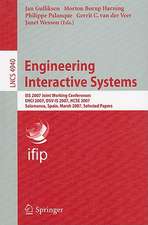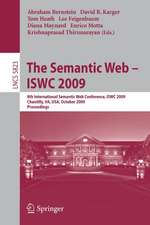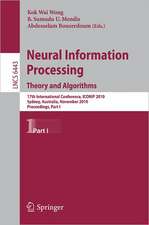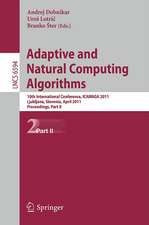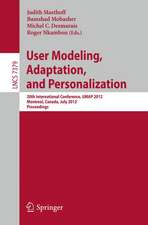Engineering Human Computer Interaction and Interactive Systems: Joint Working Conferences EHCI-DSVIS 2004, Hamburg, Germany, July 11-13, 2004, Revised Selected Papers: Lecture Notes in Computer Science, cartea 3425
Editat de Rémi Bastide, Philippe Palanque, Jörg Rothen Limba Engleză Paperback – 4 iul 2005
Din seria Lecture Notes in Computer Science
- 20%
 Preț: 1061.55 lei
Preț: 1061.55 lei - 20%
 Preț: 307.71 lei
Preț: 307.71 lei - 20%
 Preț: 438.69 lei
Preț: 438.69 lei - 20%
 Preț: 579.30 lei
Preț: 579.30 lei -
 Preț: 410.88 lei
Preț: 410.88 lei - 17%
 Preț: 427.22 lei
Preț: 427.22 lei - 20%
 Preț: 596.46 lei
Preț: 596.46 lei - 15%
 Preț: 448.04 lei
Preț: 448.04 lei - 20%
 Preț: 353.50 lei
Preț: 353.50 lei -
 Preț: 389.49 lei
Preț: 389.49 lei - 20%
 Preț: 309.90 lei
Preț: 309.90 lei - 20%
 Preț: 645.28 lei
Preț: 645.28 lei - 20%
 Preț: 763.23 lei
Preț: 763.23 lei - 15%
 Preț: 580.46 lei
Preț: 580.46 lei - 20%
 Preț: 310.28 lei
Preț: 310.28 lei - 20%
 Preț: 655.02 lei
Preț: 655.02 lei - 20%
 Preț: 1183.14 lei
Preț: 1183.14 lei - 20%
 Preț: 340.32 lei
Preț: 340.32 lei -
 Preț: 449.57 lei
Preț: 449.57 lei - 20%
 Preț: 591.51 lei
Preț: 591.51 lei - 18%
 Preț: 938.83 lei
Preț: 938.83 lei - 20%
 Preț: 337.00 lei
Preț: 337.00 lei - 20%
 Preț: 649.50 lei
Preț: 649.50 lei - 20%
 Preț: 607.40 lei
Preț: 607.40 lei - 20%
 Preț: 1414.79 lei
Preț: 1414.79 lei - 20%
 Preț: 1024.44 lei
Preț: 1024.44 lei - 20%
 Preț: 583.40 lei
Preț: 583.40 lei - 20%
 Preț: 453.32 lei
Preț: 453.32 lei - 20%
 Preț: 575.49 lei
Preț: 575.49 lei - 20%
 Preț: 1075.26 lei
Preț: 1075.26 lei - 20%
 Preț: 585.88 lei
Preț: 585.88 lei - 20%
 Preț: 825.93 lei
Preț: 825.93 lei - 17%
 Preț: 360.20 lei
Preț: 360.20 lei - 20%
 Preț: 763.23 lei
Preț: 763.23 lei - 20%
 Preț: 340.32 lei
Preț: 340.32 lei - 20%
 Preț: 504.58 lei
Preț: 504.58 lei - 20%
 Preț: 369.13 lei
Preț: 369.13 lei - 20%
 Preț: 580.93 lei
Preț: 580.93 lei - 20%
 Preț: 343.62 lei
Preț: 343.62 lei - 20%
 Preț: 350.21 lei
Preț: 350.21 lei - 20%
 Preț: 583.40 lei
Preț: 583.40 lei - 20%
 Preț: 583.40 lei
Preț: 583.40 lei - 15%
 Preț: 438.59 lei
Preț: 438.59 lei - 20%
 Preț: 341.95 lei
Preț: 341.95 lei - 20%
 Preț: 238.01 lei
Preț: 238.01 lei - 20%
 Preț: 538.30 lei
Preț: 538.30 lei
Preț: 338.49 lei
Preț vechi: 423.11 lei
-20% Nou
Puncte Express: 508
Preț estimativ în valută:
64.77€ • 69.26$ • 54.00£
64.77€ • 69.26$ • 54.00£
Carte tipărită la comandă
Livrare economică 17 aprilie-01 mai
Preluare comenzi: 021 569.72.76
Specificații
ISBN-13: 9783540260974
ISBN-10: 3540260978
Pagini: 416
Ilustrații: XII, 404 p.
Dimensiuni: 155 x 235 x 22 mm
Greutate: 0.59 kg
Ediția:2005
Editura: Springer Berlin, Heidelberg
Colecția Springer
Seriile Lecture Notes in Computer Science, Programming and Software Engineering
Locul publicării:Berlin, Heidelberg, Germany
ISBN-10: 3540260978
Pagini: 416
Ilustrații: XII, 404 p.
Dimensiuni: 155 x 235 x 22 mm
Greutate: 0.59 kg
Ediția:2005
Editura: Springer Berlin, Heidelberg
Colecția Springer
Seriile Lecture Notes in Computer Science, Programming and Software Engineering
Locul publicării:Berlin, Heidelberg, Germany
Public țintă
ResearchCuprins
Usability.- Bringing Usability Concerns to the Design of Software Architecture.- Empirical Usability Testing in a Component-Based Environment: Improving Test Efficiency with Component-Specific Usability Measures.- Software Architecture Analysis of Usability.- Task Modelling.- Support for Task Modeling – A ”Constructive” Exploration.- DynaMo-AID: A Design Process and a Runtime Architecture for Dynamic Model-Based User Interface Development.- Using Task Modelling Concepts for Achieving Adaptive Workflows.- Browsing and Searching.- Mixing Research Methods in HCI: Ethnography Meets Experimentation in Image Browser Design.- ”Tell Me a Story” Issues on the Design of Document Retrieval Systems.- Model-Based Approaches.- CanonSketch: A User-Centered Tool for Canonical Abstract Prototyping.- Finding Iteration Patterns in Dynamic Web Page Authoring.- Very-High-Fidelity Prototyping for Both Presentation and Dialogue Parts of Multimodal Interactive Systems.- USIXML: A Language Supporting Multi-path Development of User Interfaces.- A Novel Dialog Model for the Design of Multimodal User Interfaces.- Navigation Patterns – Pattern Systems Based on Structural Mappings.- Ubiquitous Computing.- Spatial Control of Interactive Surfaces in an Augmented Environment.- Manipulating Vibro-Tactile Sequences on Mobile PC.- Bridging Viewpoints.- Formalising an Understanding of User-System Misfits.- Supporting a Shared Understanding of Communication-Oriented Concerns in Human-Computer Interaction: A Lexicon-Based Approach.- A Seamless Development Process of Adaptive User Interfaces Explicitly Based on Usability Properties.- Plastic and Adaptive Interfaces.- More Principled Design of Pervasive Computing Systems.- Towards a New Generation of Widgets for Supporting Software Plasticity: The”Comet”.- Using Interaction Style to Match the Ubiquitous User Interface to the Device-to-Hand.- Supporting Flexible Development of Multi-device Interfaces.- Groupware.- The Software Design Board: A Tool Supporting Workstyle Transitions in Collaborative Software Design.- Supporting Group Awareness in Distributed Software Development.
Caracteristici
Includes supplementary material: sn.pub/extras
